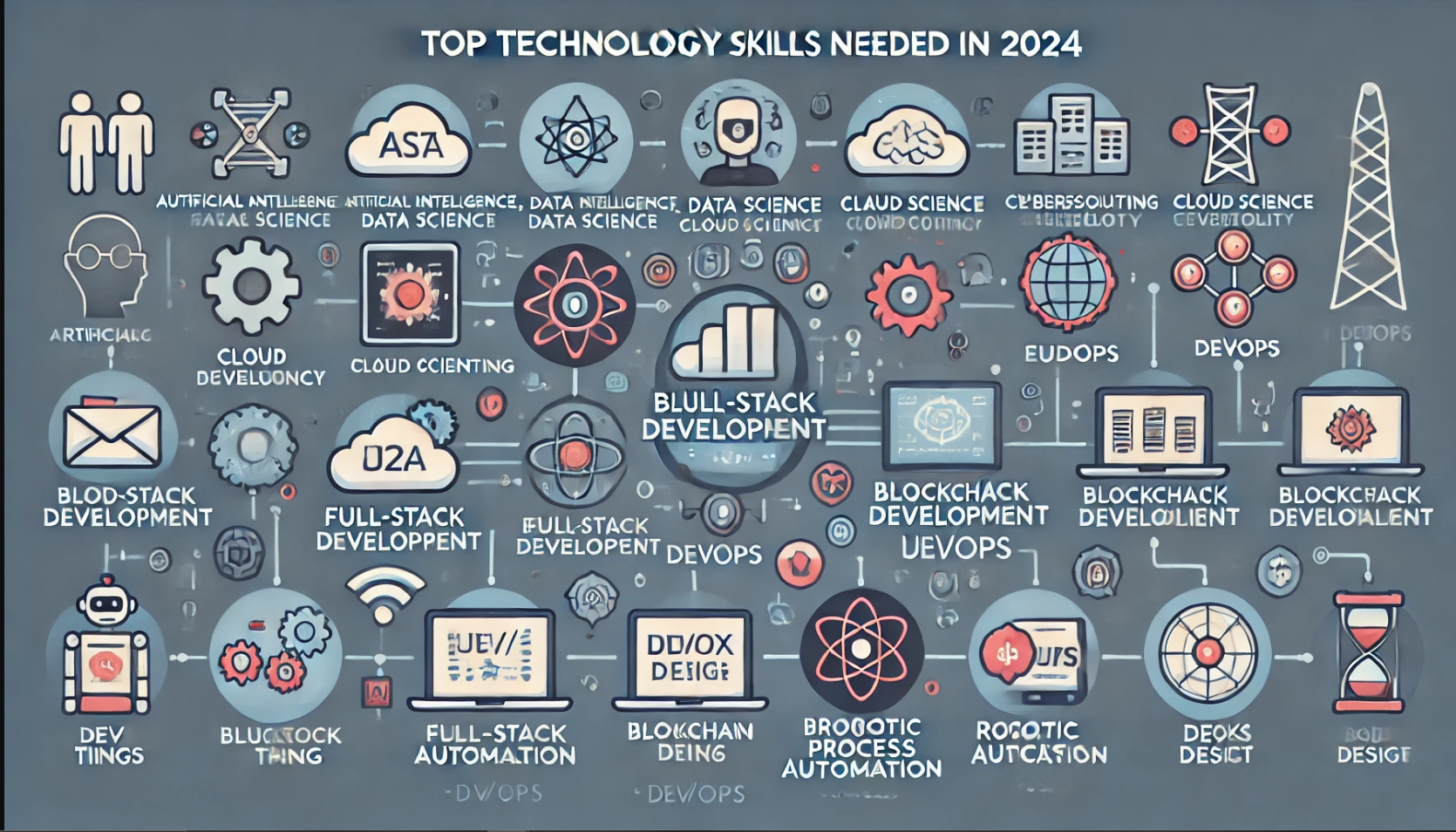Top Technology Skills worth Learning in 2025
Discover the latest tech trends with our comprehensive guide on Machine Learning and AI, Data Science, Cloud Computing, Cybersecurity, Full-Stack Development, Blockchain, IoT, DevOps, UI/UX Design, and Robotic Process Automation.
Explore key skills, emerging tools, and best practices that are shaping the future of technology. Whether you're a seasoned professional or a curious learner, our insights will help you stay ahead in the rapidly evolving digital landscape.
Here are the top 10 tech skills that are in high demand and will enhance your career prospects!
1. Machine learning (ML) and Artificial Intelligence (AI)
The goal of AI and ML is to build intelligent computer systems that are capable of independent decision-making and data-driven learning. Many sectors utilize this to improve services, automate operations, and develop new products. Proficiency in programming, comprehension of algorithms, and data analysis are critical competencies in this domain.
Key Skills: Proficiency in computer vision, deep learning, neural networks, Python, TensorFlow, and PyTorch is crucial.
2. Data Science and Analytics
Data science is the study of big data sets to identify information and patterns that are helpful. Through the study of trends and the prediction of future events, this aids businesses in making better decisions. Working with statistics, visualizing data to make it easier to understand, and developing models that can predict future trends.
Key Skills: Essential competencies include statistics, data visualization, trend forecasting, SQL, Python, R, Tableau, and SAS.
3. Cloud Computing
Cloud computing revolutionizes business operations by providing scalable infrastructure and services via the internet, including servers, databases, and storage solutions. Proficiency in cloud architecture (AWS, Azure), DevOps practices for continuous integration and deployment (CI/CD), and ensuring robust data security are critical skills in this domain.
Key Skills: AWS, Microsoft Azure, Google Cloud, DevOps, microservices, cloud architecture, and cloud security.
4. Cybersecurity
Cybersecurity is the defense against intrusions and illegal access to computers, networks, and data. It guarantees data security and privacy. A thorough understanding of networking and IT is necessary to comprehend how various system components interact and require protection.
Key Skills: include network security, vulnerability testing, risk assessment, incident response, CISSP, CEH, and CompTIA Security+.
5. Full-Stack Development
Full-stack developers manage both front-end (user interface) and back-end (server-side) components of web applications, requiring proficiency in HTML, CSS, JavaScript, and frameworks like React, Angular, or Vue.js. Knowledge of server-side languages (Node.js, Python) and database management (SQL, MongoDB) are also critical.
Key Skills: HTML, CSS, JavaScript, frameworks like React, Angular, and Vue.js, server-side languages (Node.js, Python, Ruby, and Java).
6. Blockchain Technology
Digital transactions are managed by a safe, decentralized ledger using blockchain technology. Transparency and security are enhanced by this, which is crucial for numerous sectors. Working in this industry requires having a solid understanding of smart contracts and cryptography.
Key Skills: Ethereum, Hyperledger, Solana, smart contracts, cryptography, and developing decentralized applications (dApps).
7. The Internet of Things (IoT)
IoT links everyday devices to the internet, enabling data collection and real-time insights for enhanced operational efficiency. Skills in wireless communication protocols (Bluetooth, Wi-Fi), sensor technologies, and managing IoT ecosystems with cloud-based platforms (AWS IoT, Azure IoT Hub) are essential for leveraging IoT solutions across industries.
Key Skills: Arduino, Raspberry Pi, AWS IoT, Azure IoT Hub, wireless connectivity, sensor data analysis, embedded systems.
8. DevOps
DevOps integrates software development with IT operations to streamline workflows and accelerate software delivery. Key skills include implementing CI/CD pipelines, version control systems (Git), cloud deployment strategies (AWS, Azure), and automation tools like Jenkins or Ansible, enabling continuous improvement and seamless deployment of applications.
Key Skills:Automation, Docker, Kubernetes, Jenkins, Ansible, Terraform, and Continuous Integration and Deployment (CI/CD) with Code Management.
9. UI/UX Design
UI/UX designers focus on creating intuitive and visually appealing digital interfaces that enhance user experience and engagement. Skills include conducting user research, wireframing, prototyping with tools like Figma or Sketch, and designing interactive experiences that align with user needs and business goals, ensuring a seamless digital journey.
Key Skills: InVision, Figma, Adobe XD, Sketch, user research, wireframing, prototyping, and interaction design.
10. Robotic Process Automation (RPA)
RPA automates repetitive tasks using software robots, improving operational efficiency and reducing human errors across industries. Skills required include scripting languages (Python, PowerShell), proficiency in RPA tools like UiPath or Blue Prism, and designing efficient workflow automation solutions that optimize business processes.
Key Skills: scripting, UiPath, Blue Prism, workflow mapping, automation anywhere, and automation.
Bonus
If you're looking for just one must-have tech skill that is broadly applicable across various domains and industries today, I would suggest proficiency in programming.
Programming skills are foundational and versatile. They enable you to automate tasks, build applications, analyze data, and solve complex problems efficiently. Whether you specialize in web development, data science, cybersecurity, or any other tech field, strong programming abilities will always be in demand. Languages like Python, JavaScript, Java, or C# are particularly valuable depending on your career path.



